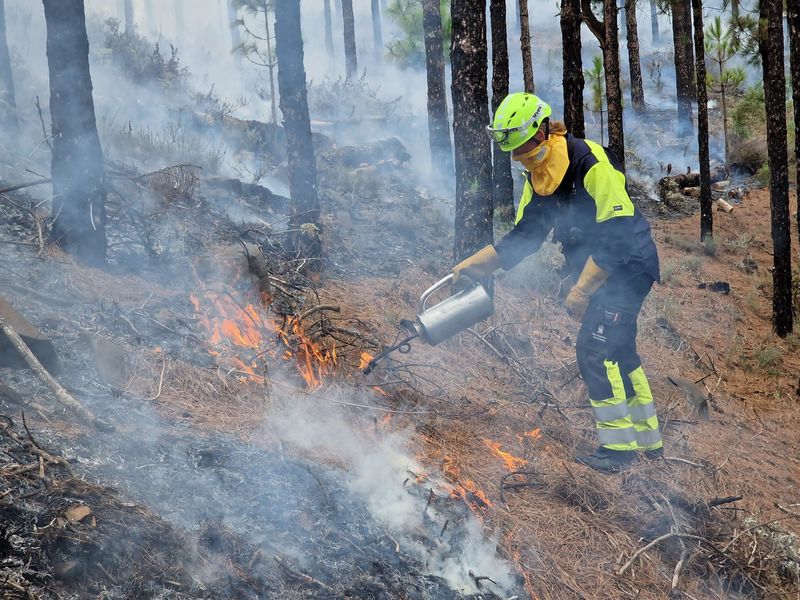Join the Declaration on the Management of Large Wildfires in Spain
Spain is facing a complex problem that is exacerbated day by day with climate change: wildfires are becoming increasingly intense and leading to unprecedented ecological and social consequences. The issue of large forest fires cannot be addressed with simple solutions based on beliefs and myths, or from biased or incomplete discourses. As a society, we have the responsibility to confront this challenge.
If you believe, as we do, that enough of misinformation, and of simple and biased solutions, and that it is necessary for the fire community to lead the debate and the effort to achieve broad consensus that provide integrated solutions for the management of large wildfires! Sign the declaration! Thank you so much.
- Declaration (pdf)
- Results of the Madrid Forum (previous work that led to the Declaration)
- Press release
- Photo Gallery of the presentation event
- List of people and institutions who has joined the Declaration
- Send your comments/suggestions about the Declaration to info@paucostafoundation.org
DECLARATION ON THE MANAGEMENT OF LARGE WILDFIRES IN SPAIN
Spain is facing a complex problem that is with climate change: wildfires are more intense and have unprecedented ecological and social consequences. The problem of large wildfires cannot be tackled with simple solutions based on beliefs and myths, nor through biased or incomplete discourses. As a society, we have the responsibility to face this challenge.
This declaration is founded on scientific data, the experience of the firefighting services and the territorial needs. It is based on the results of the Forum for debate and proposals for action for the management of large wildfires in Spain (Madrid, 29-30 March, 2023), organised by the Pau Costa Foundation), which involved experts from the wildfire community from different sectors and regions.
We declare that we need landscapes that are alive, diverse, resistant and resilient to large wildfires, and for that reason, we consider the following to be necessary:
1. Society needs to be aware that the firefighting services cannot tackle large wildfires alone, as these wildfires are often beyond their firefighting capacity.
2. We need to demand the co-responsibility of society in dealing with wildfires and assume the inevitable risk of living with fire. Without it, the lack of landscape management leads to situations that are indefensible in the face of large, simultaneous wildfires.
3. We need to demand that the firefighting services are able to work in landscapes that are safe for them and for society.
4. It is urgent that at least 1% of the national forest cover (260,000 ha) is managed annually to prepare the land to face large wildfires, prioritizing strategic management areas.
5. To implement the previous urgent action, which is essential and non-deferrable, €1,000M to be allocated annually to manage the forested landscapes on the national scale. This action requires regular maintenance to be effective.
6. Land planning and management should take into account the particularities and risks of each situation, promoting heterogeneity of the landscape and nature conservation where necessary with the support of practices such as silviculture, the use of fire and domestic and wild herbivory, among others.
7. It is a priority to implement and maintain 100% of the protective infrastructures at wildland-urban interface, to guarantee the safety of the citizens. The appropriate means and resources should be allocated to allow the competent administration to manage those spaces.
8. As a matter of urgency, the administration and residents affected must develop and implement self-protection plans against wildfires for residential areas and infrastructures.
9. It is essential to promote a living rural society, with an environmentally-sustainable primary sector, thus encouraging the consumption of local products and valorisation of forest products (timber and non-timber).
10. It is necessary to implement financial measures such as the reduction of tax pressures on rural inhabitants and land managers, as well as to define a system of payment for ecosystem services to which society can contribute.
11. The conservation of biodiversity is a priority. There must be guarantees that conservation is compatible with wildfire prevention management.
12. The preservation and management of protected natural spaces where wildfire risk is high should include actions to mitigate the risk. Those actions need to be adapted to the fire regimes, identify strategic management areas and ensure the conservation of the environmental values and services to be defended.
13. It is necessary to work towards the convergence of urban and rural visions of the current scenarios of large wildfires through research, education and communication. Emphasis must be placed on the fact that fire is a natural and cultural element that has shaped our landscapes and the fact that there is an inevitable risk, despite the measures employed in the territory.
14. Improved annual statistics on the impacts of fire suppression and prevention actions are needed. Those data should help us to understand wildfire behaviour, the types of operations deployed and their cost, as well as the number and extension of preventive actions, both planned and implemented.
15. The legislation must include wildfire management in national, European and sectoral policies (mainly conservation, and urban and agricultural planning). Thus, it will allow the need to make preventative management of the territory a priority to be to anticipated, financed and guaranteed.
[1] The percentage must be adapted to the socio-ecological reality of each region and landscape. Study of reference: Finney Mark A., Seli Rob C., McHugh Charles W., Ager Alan A., Bahro Bernhard, Agee James K. (2007) Simulation of long-term landscape-level fuel treatment effects on large wildfires. International Journal of Wildland Fire 16, 712-727.
[2] Approximate investment based on the average cost of fuel management per hectare, estimated on €3,130/ha, calculated using prices published by Grupo Tragsa to define a system of payment for ecosystem services to which It i



